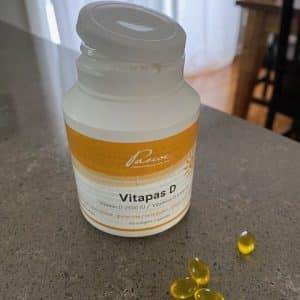Vitamin D Deficiency: Signs and Symptoms

Symptoms of Vitamin D Deficiency
The following symptoms correspond frequently to low vitamin D levels on blood testing:
Frequent respiratory tract infections: Having blood levels of vitamin D in the normal range (i.e. generally above 50 nmol in the research) is associated with fewer respiratory tract infections and a reduced risk of being hospitalized because of those infections. Taking vitamin D supplements when your blood levels are on the higher end is unlikely to offer further benefit.
Pain: Sometimes low back pain resolves when vitamin D levels become optimal. Pain over your shins, sternum (breastbone) or forearms – including the pain of Carpal Tunnel Syndrome – can signify a vitamin D deficiency.
Sweating at night, at the back of your head: Crazy but true. Quite a few patients note that this strange symptom resolves once we get their levels of vitamin D correct.
Intolerance to statin medications: I likely see a disproportionate number of people who experience side-effects from these cholesterol-lowering medications. Side-effects might be more likely in people who have a vitamin D deficiency.
Understand Why You’re Vitamin D Deficient
Sometimes low vitamin D levels reflect a simple vitamin D deficiency. A quick exploration of the cause of this deficiency might lead us to address fat malabsorption and start supplementing with an emulsified vitamin D supplement. Or we might have a discussion about genetic variations called “snps” that impact vitamin D metabolism.
However, low vitamin D levels might also be the hallmark of chronic immune system stimulation or dysfunction. In my practice, which includes people with chronic fatigue conditions and environmental illness, a vitamin D deficiency often signals poorly managed inflammation. In these cases, we investigate environmental exposures, allergies, and chronic infection as possible players in chronic symptoms. Once we address these drivers of inflammation, we find that vitamin D levels rise easily with low-dose supplementation.
This matters because there’s some debate over whether taking high doses of vitamin D is harmful during an acute infection, or when external factors that drive the immune system are left unattended. Sometimes, low vitamin D might be an intentional and appropriate state of the body, rather than an error or genuine “vitamin” deficiency. (To learn more about this, you’ll have to take a dive deep into Dr. Naviaux’s work on the Cell Danger Response.)
Optimal Vitamin D Dose
Patients and healthcare providers understandably have a difficult time sorting through the dogma of vitamin D dosing. The fact is, we’re inundated with research saying that supplementing with vitamin D based on blood values does not reduce risk of fracture, cancer, heart disease, and a myriad of other concerns. This is countered by hundreds of studies and experts who promote vitamin D doses higher than 10,000IU each day or week, for optimal health.
Given the conflicting opinions and higher-stakes concerns with vitamin D and immune system function, if you’re choosing to supplement with more than 2500IU of vitamin D, please do so with the support of a knowledgeable healthcare provider:
- Use blood testing that also assesses kidney function, liver function, calcium levels, and inflammation. You want to know that your body is healthy enough to metabolize that vitamin D hormone safely.
- Recognize that Vitamin D blood testing is far from perfect. Vitamin D has dozens of metabolites and we measure just one or two of these in the blood.
- As a hormone, we’re not really using this blood work to identify a nutrient deficiency. Instead, we’re using these numbers as biomarkers that point to imbalances in the body. You don’t want to overlook these imbalances.
- Supplement with the vitamins and minerals believed to become depleted when taking higher doses of vitamin D. I often use a multivitamin that includes mixed natural tocopherols (vitamin E), vitamin A, vitamin K (in various forms), zinc, and magnesium.
One of our Naturopathic Doctors, Dr. Naghmeh Mirrhosseini, has published much research on vitamin D and regularly supports her patients through this process. All Naturopathic Doctors in Ontario can requisition the necessary blood work and NDs who’ve acquired their prescribing license can prescribe doses of vitamin D higher than 2500IU. (Vitamin D doses higher than 2500IU are a drug prescription in the province of Ontario.)
Advanced Learning Resources
It’s not possible to include a comprehensive list here of educational resources and research papers. I’ve chosen just a few to emphasize the profound polarization on this topic and the need for better individualized healthcare interventions.
Proponents against vitamin D testing and higher-dose supplementation: Take a look at the Endocrinology Society guidelines 2024, or one of the many studies published in the New England Journal of Medicine. (Please keep in mind that a “lack of evidence” or “not supported by the evidence” is not the same thing as “ineffective”.)
For a broader understanding of the role of vitamin D in health, please read about vitamin D supplementation and the microbiome in Nature, vitamin D and Cell Danger Response, the role of the vitamin D receptor in autoimmunity and in pain signalling.
Here are some more conventional but forward-thinking vitamin D papers published in Anticancer Research, resulting from an international symposium in Germany, “Vitamin D in Prevention and Therapy”, in 2022.
immune system, nutrition, pain